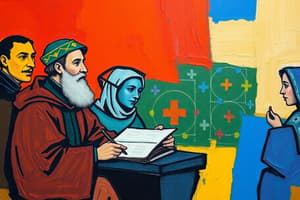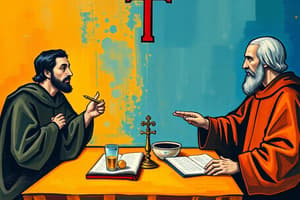Podcast
Questions and Answers
What was the primary focus of Spartan education?
What was the primary focus of Spartan education?
- Development of military tactics (correct)
- Arithmetic and music
- Civic responsibility and administration
- Literature and poetry
During which period did Rome establish its emphasis on practical education skills?
During which period did Rome establish its emphasis on practical education skills?
- A.D. 100 - A.D. 450
- A.D. 700 - A.D. 1000
- 500 B.C. - 100 B.C.
- 750 B.C. - A.D. 450 (correct)
What role did the Sophists play in education?
What role did the Sophists play in education?
- They taught physical education in schools.
- They focused on military training.
- They developed arithmetic skills only.
- They emphasized rhetoric and civic responsibility. (correct)
What was a significant part of education in Athenian culture?
What was a significant part of education in Athenian culture?
What system did the Romans create to codify laws for education?
What system did the Romans create to codify laws for education?
What was the age range for compulsory school attendance established by law?
What was the age range for compulsory school attendance established by law?
Which curriculum subjects were included in the elementary education during the period mentioned?
Which curriculum subjects were included in the elementary education during the period mentioned?
What key educational reform occurred with the establishment of the Malolos Constitution?
What key educational reform occurred with the establishment of the Malolos Constitution?
Who were the Thomasites and what was their significance?
Who were the Thomasites and what was their significance?
What was one of the main focuses of education during the Commonwealth Period?
What was one of the main focuses of education during the Commonwealth Period?
Which educational initiative was signed by President Manuel L. Quezon in 1936?
Which educational initiative was signed by President Manuel L. Quezon in 1936?
What type of education was emphasized alongside vocational education during the Commonwealth Period?
What type of education was emphasized alongside vocational education during the Commonwealth Period?
Which level of education was established as part of the three-level school system set up by the Department of Public Instruction?
Which level of education was established as part of the three-level school system set up by the Department of Public Instruction?
What is the primary purpose of education in society?
What is the primary purpose of education in society?
According to John Dewey, how does school contribute to society?
According to John Dewey, how does school contribute to society?
What is anticipatory socialization?
What is anticipatory socialization?
Which of the following was NOT mentioned as a life skill developed in primitive societies?
Which of the following was NOT mentioned as a life skill developed in primitive societies?
How did early humans learn essential skills for survival?
How did early humans learn essential skills for survival?
Which statement best describes socialization?
Which statement best describes socialization?
What role do adolescents play in the socialization process?
What role do adolescents play in the socialization process?
Which is an example of an institution that fulfills a social function in society?
Which is an example of an institution that fulfills a social function in society?
What characterizes education during the Pre-colonial period in the Philippines?
What characterizes education during the Pre-colonial period in the Philippines?
Which significant change occurred in education during the Spanish Era?
Which significant change occurred in education during the Spanish Era?
What was a major characteristic of education under the Spanish regime in the Philippines?
What was a major characteristic of education under the Spanish regime in the Philippines?
What did the Educational Decree of 1863 provide for the Filipino educational system?
What did the Educational Decree of 1863 provide for the Filipino educational system?
Who were primarily responsible for teaching during the Pre-colonial period?
Who were primarily responsible for teaching during the Pre-colonial period?
What was the primary goal of education during the Pre-colonial period?
What was the primary goal of education during the Pre-colonial period?
Which group was primarily accommodated in schools during the Spanish period?
Which group was primarily accommodated in schools during the Spanish period?
How was education structured during the Spanish period compared to the Pre-colonial period?
How was education structured during the Spanish period compared to the Pre-colonial period?
What significant change was made to the elementary education structure in the Education Act of 1940?
What significant change was made to the elementary education structure in the Education Act of 1940?
During the Japanese occupation, which aim was NOT part of their educational objectives?
During the Japanese occupation, which aim was NOT part of their educational objectives?
What was a requirement established under Executive Order No. 263?
What was a requirement established under Executive Order No. 263?
Which law made Civil Service Eligibility for teachers permanent?
Which law made Civil Service Eligibility for teachers permanent?
What was one of the aims of education as stated in the 1973 Constitution?
What was one of the aims of education as stated in the 1973 Constitution?
What notable change occurred in schools with the passage of R.A. 1265?
What notable change occurred in schools with the passage of R.A. 1265?
What was one focus of education during the Japanese occupation?
What was one focus of education during the Japanese occupation?
Which curriculum requirement was standardized for all schools following the legislation mentioned?
Which curriculum requirement was standardized for all schools following the legislation mentioned?
Flashcards are hidden until you start studying
Study Notes
Educational Reforms from A.D. 1500 - A.D. 1600
- Emphasis on specific religious denominations and the cultivation of general literacy.
- Focus on reading, writing, elementary arithmetic, and catechism education.
- Establishment of classical schools primarily for the upper classes, ensuring doctrinal conformity.
Pre-Colonial Period Education
- Informal, decentralized education with a focus on practical survival skills.
- Fathers taught hunting and livelihood skills; mothers taught domestic responsibilities.
- Education geared towards vocational training rather than academics; tribal tutors (Babaylan) as educators.
Spanish Period Education
- Shifted to formal, organized, and authoritarian education with a religious orientation.
- Spanish missionaries replaced tribal tutors; schooling focused on Christian doctrines.
- Separate schools for boys and girls; the wealthy (ilustrados) received advanced education.
- Educational Decree of 1863 established a complete system of education from elementary to collegiate levels.
Foundations of Education
- Education as a societal function, preserving societal values and maintaining stability.
- Schools serve to socialize children, developing effective self-direction and community membership.
- Socialization is a lifelong process, critical for role learning and preparing for future responsibilities.
Education in Primitive Societies
- Survival skills developed as cultural patterns in response to environmental challenges.
- Education occurred through observation and direct teaching by parents and elders.
- Essential skills included tool-making, adherence to moral codes, and language acquisition.
Roman Education (750 B.C. - A.D. 450)
- Emphasis on civic responsibility in education to develop a good citizen.
- Courses included reading, writing, arithmetic, and rhetoric; formal schools established.
- Instruction focused on practical skills for administrative and military responsibilities.
Arabic Education (A.D. 700)
- Establishment of elementary schools in municipalities with a curriculum touching on multiple subjects.
- Religion was central, with reading, writing, and arithmetic taught alongside history and agriculture.
- Compulsory attendance for children aged 7 to 12.
American Regime Education (1898-1946)
- Introduction of democratic ideals and a system of free, compulsory elementary education.
- The first American school established in Corregidor in 1898; widespread school openings followed.
- Thomasites arrived in 1901, leading to the foundation of the University of the Philippines in 1908.
- A three-level school system was developed, emphasizing both public and vocational education.
Commonwealth Period (1935-1942)
- Free public education mandated by the 1935 Constitution; vocational education was prioritized.
- Curriculum included nationalism and good manners; private schools overseen by the government.
- Key executive orders addressed the importance of the national language (Tagalog) in education.
Japanese Occupation Education
- Focus on promoting the Philippines' role in East Asia, fostering a new Filipino culture.
- Education aimed at reducing reliance on Western powers; emphasis on vocational training.
- Promotion of the Japanese language, with efforts to limit English usage in schools.
Post-Colonial Education
- Education aims to realize democratic ideals, with permanent civil service eligibility for teachers.
- Compulsory daily flag ceremonies and inclusion of Filipino national literature in curricula.
- The Magna Carta for Teachers established fundamental educational rights and provisions.
- The 1973 Constitution's goals: love of country, citizenship duties, and moral character development.
Studying That Suits You
Use AI to generate personalized quizzes and flashcards to suit your learning preferences.




